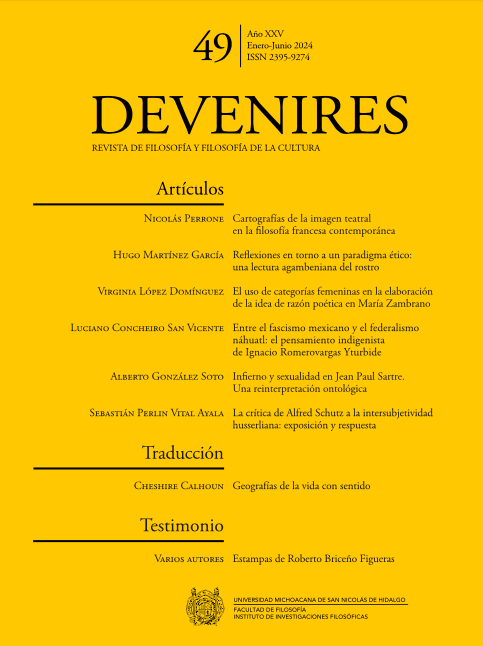Reflections on an ethical paradigm: an agambenian interpretation of the face to face
DOI:
https://doi.org/10.35830/devenires.v25i49.917Keywords:
profanation, Levinas, sociality, biopolitics, whatever singularityAbstract
The aim of this article is to offer an interpretation of the ethical moment that Levinas calls face-face as a paradigmatic case of profanation. For this purpose, a reading of three Agambenian concepts is carried out: paradigm, whatever singularity and profanation. Based on the analytical possibilities this conceptual triad offers, Levinasian ethics is interpreted as a type of paradigmatic activity capable of deactivate the biopolitical devices of government, above all, in terms of the social division that they generate. In this sense, the possibility of restoring a use of sociality which is currently captured by biopolitical devices opens up. Thus, the objective is to argue for an analytical path that opens possibilities of understanding —and eventual solution— regarding the claim of a social dimension that is diminished today; it is about restoring the face-face relationship to common use, deactivating the devices that make it a mere moment subordinated to the given order.
References
Agamben, G. (1996). La comunidad que viene. Pre-textos.
Agamben, G. (1998). Homo Sacer: El poder soberano y la nuda vida. Pre-textos.
Agamben, G. (2001). Medios sin fin. Pre-textos.
Agamben, G. (2005a). Profanaciones. Adriana Hidalgo.
Agamben, G. (2005b). Lo que queda de Auschwitz. El archivo y el testigo. Homo Sacer III. Pre-textos.
Agamben, G. (2010). Signatura rerum. Sobre el método. Anagrama.
Agamben, G. (2014). ¿Qué es un dispositivo? Seguido de El amigo y La iglesia y el Reino. Adriana Hidalgo.
Agamben, G. (2018). El uso de los cuerpos. Adriana Hidalgo.
Castro, E. (2008). Giorgio Agamben. Una arqueología de la potencia. UNSAM.
Chalier, C. (2004). La huella del infinito. Emmanuel Levinas y la fuente hebrea. Herder.
Laval, C. y Dardot. P. (2013) La nueva razón del mundo. Ensayo sobre la sociedad neoliberal. Gedisa.
Feron, E. (1992). De l’idée de transcendance à la question du langage. Jérôme Millon.
Fink, E. (1968). The Oasis of happiness. Towards an ontology of play. Yale French Studies, No. 41 pp. 19-30. https://doi.org/10.2307/2929663
Frost, T. (2014). Thinking relationality in Agamben and Levinas. Griffith Law Review, 23:2, 210-231. https://doi.org/10.1080/10383441.2014.962682
Hernández, C. (2022). La museificación de la obra de arte y de la ciudad. Un ensayo sobre la figura del Museo en el pensamiento de Giorgio Agamben y Guy Debord. Valenciana, núm. 29, 315-345. https://doi.org/10.15174/rv.v14i29.622
Levinas, E. (1998). Éthique comme philosophie première. Rivage poche. Petite Bibliothèque.
Levinas, E. (2003). De otro modo que ser o más allá de la esencia. Sígueme.
Levinas, E. (2006a). De la existencia al existente. Arena.
Levinas, E. (2006b). Humanismo del otro hombre. Siglo veintiuno.
Levinas, E. (2015). Escritos inéditos 2. Palabra y silencio y otros escritos. Trotta.
Levinas, E. (2020). Totalidad e infinito. Ensayo sobre la exterioridad. Sígueme.
Malka, S. (2006). Emmanuel Lévinas. La vida y la huella. Trotta.
Martínez, H. (2022). Reflexiones sobre el proceso de subjetivación. Una lectura general de la fenomenología levinasiana. Tópicos, (64), 119-154. https://doi.org/10.21555/top.v640.2032
Murakami, Y. (2002). Lévinas phénoménologue. Jérôme Millon.
Urabayen, J. (2005). Las raíces del humanismo de Levinas: el judaísmo y la fenomenología. EUNSA.
Salinas, A. (2014). La semántica biopolítica. Foucault y sus recepciones. Cenaltes.
Downloads
Published
How to Cite
Issue
Section
License
Copyright (c) 2023 UMSNH

This work is licensed under a Creative Commons Attribution-NonCommercial-NoDerivatives 4.0 International License.


 Devenires, Año XXVII, Núm. 53, Enero-Junio 2026 es una publicación semestral editada por la Universidad Michoacana de San Nicolás de Hidalgo (Santiago Tapia 403, Centro Histórico, Morelia, Michoacán, México, C.P. 58000, Tel. (+52) 44-3322-3500), a través de la Facultad de Filosofía y el Instituto de Investigaciones Filosóficas (Ciudad Universitaria, Edificio C-4, Morelia, Michoacán, México, C.P. 58030, Tel (+52) 44-3322-3500 ext. 4148). Editor responsable: Dr. Federico Marulanda Rey (
Devenires, Año XXVII, Núm. 53, Enero-Junio 2026 es una publicación semestral editada por la Universidad Michoacana de San Nicolás de Hidalgo (Santiago Tapia 403, Centro Histórico, Morelia, Michoacán, México, C.P. 58000, Tel. (+52) 44-3322-3500), a través de la Facultad de Filosofía y el Instituto de Investigaciones Filosóficas (Ciudad Universitaria, Edificio C-4, Morelia, Michoacán, México, C.P. 58030, Tel (+52) 44-3322-3500 ext. 4148). Editor responsable: Dr. Federico Marulanda Rey (
